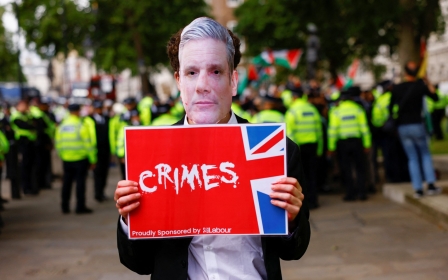Starmer needs to break with the failed playbook on Palestine, Israel and Ukraine

A very clear message is being delivered to centrist governments across the western world, but, after multiple failures at home and abroad, they still don't get it. They are deaf to the roar of popular protest.
It is this: governments which have been in power since the end of the Second World War are failing to tame capitalism’s worst excesses; they are presiding over a growing wealth gap.
They are failing to sustain the welfare state and the essential services their populations demand. They indulge in wars they do not win. They clock up record levels of national debt. They are failing repeatedly to produce stable societies.
They can’t allow banks to fail, but they throw their pensioners to the dogs. In defence of what they call liberal democracy - it is neither - they turn increasingly to illiberal means. This collapsing political order is primarily responsible for the rise of the far right.
In France at the weekend, this message came through loud and clear. A quick election called by the Blairite Emmanuel Macron turned into an electoral disaster for him, but happily not for France.
New MEE newsletter: Jerusalem Dispatch
Sign up to get the latest insights and analysis on Israel-Palestine, alongside Turkey Unpacked and other MEE newsletters
Against all expectations the left, for long so dormant and written off, stormed to victory in the parliamentary elections, pushing the insurgent far right into third place.
The people of France delivered a very clear message. Their thirst and appetite for real change, radical change, is much stronger than that of the president who purports to lead them.
Clear message
In Britain, the same message was delivered to Keir Starmer, who won a large parliamentary majority on a wafer-thin number of votes. Starmer only got 34 percent of the vote, 600,000 fewer votes than Jeremy Corbyn received in 2019 and three million votes fewer than the former Labour leader got in 2017.
In constituencies with a large Muslim majority, the message to Starmer was even clearer.
Follow Middle East Eye's live coverage of the Israel-Palestine war
An analysis shared with Middle East Eye but yet to be published shows that in the 20 top Muslim constituencies, Labour’s share of the the vote dropped by between 15 percent and 44.6 percent.
Since the 2019 election, it dropped by 44.6 percent in Bradford West, 35.5 percent in Birmingham Hall Green and Moseley, 40.5 percent in Birmingham Ladywood, 36.2 percent in Dewsbury and Batley, 35 percent in Leicester South, 20 percent in Ilford North and 15 percent in Luton North.
When asked about his relationship with the Muslim community, Britain’s new prime minister was dismissive: "We have a strong mandate but we did not secure the votes. We will address that, whereas I don't think there is anything to dispute the mandate we have, and that it's a mandate for change, for renewal and for politics as public service."
But the rejection of the Muslim community has not gone unnoticed by senior Labour figures.
Wes Streeting, the new health secretary, who voted repeatedly as an opposition MP against a ceasefire in Gaza, and who consequently squeaked in by 528 votes in Ilford North, had to admit: "Looking at the results across the country including Ilford North, it is very clear that Gaza has been a real issue for the Labour Party at this election."
The Muslim vote is the largest bloc vote in the party and it is not coterminous with Corbyn or the populist left.
They agree on Palestine and in their opposition to the many destructive western wars in Muslim countries which Corbyn has persistently and bravely opposed, but on some social issues, they part company.
The strength of the Muslim vote, which unseated four Labour MPs in favour of pro-Gaza independents, should not have come as a surprise to Starmer, who, as opposition leader, went out of his way to court the pro-Israel lobby.
Starmer richly and consciously earned the rejection of the Muslim vote, calculating coldly that he can get his votes from disaffected conservatives instead. So, the Labour leader consciously dismantled some of the main tenets of his party’s policy on Palestine.
Failures recycled
Starmer changed the party policy by saying Labour would only recognise a Palestinian state that was acceptable to Israel. He rejected anti-Zionism and the BDS movement, which as a human rights lawyer he had once campaigned for.
He not only backed Israel’s savage bombardment of Gaza by saying repeatedly that Israel had the right to defend itself. He told LBC radio that Israel had the right to withhold power and water from Gaza and voted against an immediate ceasefire.
Asked early on in the Gaza war how many dead Palestinians would it take for Labour to call for a ceasefire, one of his top advisers on the Middle East replied: "As many as it takes."
Starmer banned elective representatives from attending pro-Palestinian rallies. The party also banned the Palestine Solidarity Campaign from describing Israel as an apartheid state in its literature for the last party conference.
The Labour leader refused to meet any Palestinian delegation in his four years as leader of the opposition. Instead, Starmer courted Tony Blair’s opinion on how to deal with the Israeli Prime Minister Benjamin Netanyahu.
Blairites such as David Miliband are being touted for roles such as ambassador to Washington. Blair’s voice is being once again taken seriously on immigration.
Blair and his team are being recycled for use by Starmer. Have we really run out of tyres so quickly that we are forced to use retreads?
This is the man who committed the worst and most consequential mistake in British foreign policy in the Middle East since the Suez Crisis.
Blair invaded Iraq on false premises, unleashing a bitter sectarian civil war which destroyed the country and created an even more vicious version of al-Qaeda in the Islamic State (IS) group.
Blair gave an oration at Ariel Sharon’s funeral, and described the Israeli leader who set off the Second Intifada by walking around Al Aqsa, and who was the army general responsible for the Sabra and Shatila massacres, as "a great statesman".
The reuse of leaders who have so palpably failed is one of the features of a dying empire. But it turns out failure is no bar to making an encore.
David Cameron who, as prime minister, was responsible for the Libyan civil war, was recycled to become foreign secretary by Rishi Sunak. Blair and his team are being recycled for use by Starmer.
Have we really run out of tyres so quickly that we are forced to use retreads?
Earning credibility
The message that electorates around the western world are giving their leaders is something quite different.
In order to become credible, you have to earn it. You have to listen to what your people are telling you. Starmer glided to power by saying as little - either as an opposition leader or as an election candidate - as he could possibly say.
Does anyone remember one thing he said, one policy he proposed in this election? I can’t.
That’s fine for getting into power, but not for staying in power. To stay in power, Starmer has to show there has in fact been a change of government.
He notably failed to do that as leader of the opposition, where he was in lockstep with Sunak over Gaza.
There are five things that Starmer could do immediately to show that the government has indeed changed.
Firstly, Britain could recognise a Palestinian state, without waiting for Israel’s permission - which is like waiting for Godot: it will never come.
Ed Miliband proposed the motion - though largely viewed as a symbolic move - recognising a Palestinian state, which was carried by parliament. The State of Palestine is recognised as a sovereign state by 145 of the 193 member states of the United Nations. It is long past time that Britain should become one of them.
Secondly, Britain should immediately reinstate funding for Unrwa, the only UN agency capable of providing education, disaster relief, employment, healthcare and nutrition for Palestinian refugees in Gaza and all over the Arab world.
No proof has ever been given for Israel’s claim that Unrwa members took part in the 7 October raid, or that as many as 10 percent of its employees worked for Hamas.
Every proof exists for a political motive in trying to defund the only UN agency that explicitly recognises Palestinian refugees. Britain should not be part of this disgraceful act of vandalism of an agency which forms the backbone of relief efforts.
How can you argue for a Palestinian state and yet help Israel destroy its education system, which is provided solely by Unrwa?
Respecting international law
The Lancet has recently recalculated the death rate in Gaza, using indirect deaths being from three to 15 times the number of direct deaths.
To continue defunding Unrwa in these circumstances is nothing short of complicity in murder
It stated: "Applying a conservative estimate of four indirect deaths per one direct death to the 37 ,396 deaths reported, it is not implausible to estimate that up to 186 ,000 or even more deaths could be attributable to the current conflict in Gaza. Using the 2022 Gaza Strip population estimate of
2, 375,259, this would translate to 7·9 percent of the total population in the Gaza Strip."
To continue defunding Unrwa in these circumstances is nothing short of complicity in murder.
Thirdly, Britain should apply international law - for the very simple reason that as the UK and US decline as world powers, the UK will have to rely on persuasion and a rules-based world order rather than brute force or sanctions.
It should be obvious even to Starmer that Britain can not advocate a rules-based world order if it breaks all the rules over its support for Israel.
Britain should drop its objections to the International Criminal Court, which is currently considering an arrest warrant for Netanyahu. There was one report that it is unlikely to go ahead with the legal move, which is encouraging if it happens.
The appointment of Richard Hermer, an experienced lawyer who has spoken out against Israel’s breaches of international law, as attorney general is another positive sign.
But Hermer’s appointment could be followed by a fourth measure which is to publish the advice of government lawyers on the legality of continuing to supply arms to Israel during acts of war which contravene the Genocide Convention or the Geneva Convention. As Shadow Foreign Secretary, David Lammy said that he had " serious concerns" about the conduct of the Israeli miliary in Gaza and urged the then government to publish legal advice on arms sales to Israel. There is nothing to stop him doing so now. Will he?
Fifth, Starmer as prime minister should break the habit of a lifetime by meeting and engaging with the representatives of the Muslim community.
Tempted though he might be to act like an authoritarian ruler, Starmer should not repeat Blair’s old trick of creating alternative forums to the Muslim Council of Britain (MCB), simply because he could not face talking to them.
A complete change
Blair created the Sufi Muslim Council in 2006. The now defunct Quilliam Foundation was launched in 2008 with £674,608 ($864,000) of Home Office funding. Its primary purpose was to identify political Islam as the driver of radicalisation.
The Middle East Eye's Ian Cobain reported how a UK government official told him that Quilliam Foundation was "actually established by the Office for Security and Counterterrorism (OSCT) at the Home Office".
The initial plan was to fund it covertly with money appearing to come from a Middle Eastern benefactor, but was actually channelled by M16.
What is Plan B for Starmer if Trump does return to the White House? Where will the UK be? It has cut itself off from the EU and is drifting somewhere in the mid-Atlantic
Starmer should stop all this nonsense. It does not work. Creating fake pro-government organisations is what autocrats like Vladimir Putin do.
It does not fool anyone in Russia and nor does it fool any Muslim living here. If anything it impedes the work of counterintelligence.
Nor will it get Labour back the Muslim vote. Starmer should start by talking to the Muslim communities' own voices and representatives. It has plenty of them and they are articulate.
Britain needs a complete change in its foreign policy and the signs are it is unlikely it will get it.
Foreign Secretary David Lammy is already behaving as if his umbilical cord to the mother ship in Washington has yet to be severed.
Is this such a wise idea, when the Democrats are struggling with Biden’s many lapses in performance, and a vengeful and fit Donald Trump is waiting in the wings?
What is Plan B for Starmer if Trump does return to the White House? Where will the UK be? It has cut itself off from the EU and is drifting rudderless somewhere in the mid-Atlantic.
Starmer promised stability. A constructive and balanced foreign policy should aim at de-escalation not re-escalation as is the case now. He will not deliver a policy fit for the 21st Century by sticking to the Atlanticist playbook. That has really passed its sell-by date.
If every war since Kosovo in 1998 has gone wrong for the western alliance, with the attempt to push Russia out of four provinces in Ukraine being only the latest example of military failure; it is time to re-write the playbook.
Even the Dayton Peace Agreement, which concluded the three-and-a-half-year Bosnian war, could now unravel under the renewed pressure of Serb nationalism.
The moment Starmer condemns the latest Russian atrocity in Ukraine, while keeping silent on the same atrocities committed on an hourly basis by Israel in Gaza, is the moment we see that there has been no change of government in Britain at all.
The views expressed in this article belong to the author and do not necessarily reflect the editorial policy of Middle East Eye.
Middle East Eye delivers independent and unrivalled coverage and analysis of the Middle East, North Africa and beyond. To learn more about republishing this content and the associated fees, please fill out this form. More about MEE can be found here.








